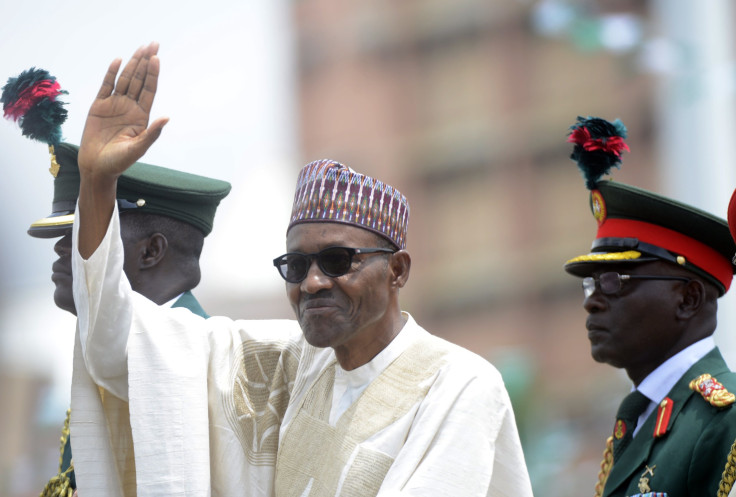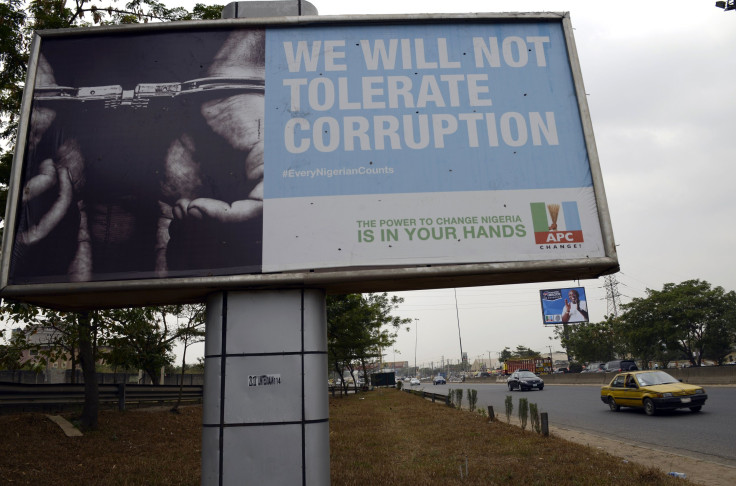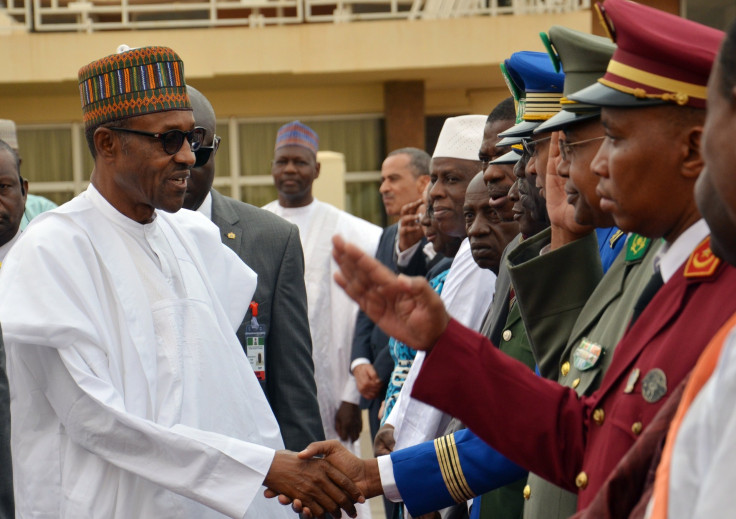Buhari As Petroleum Minister And President Is Problematic For Nigerian Economy, Governance, Experts Say

Nigerian President Muhammadu Buhari is working to defeat Boko Haram militants, root out government corruption and overhaul the country’s large but fragile economy, among other things. And now the 72-year-old leader plans to add to his to-do list running Nigeria's petroleum ministry, one of the most powerful and controversial posts in the presidential cabinet.
Buhari, who previously served as petroleum minister, has vowed to halt corruption in the nation's powerful oil sector. But experts said the Nigerian leader isn’t an oil expert and keeping the crucial portfolio for himself will divert attention from his presidential duties at a time when Nigeria needs to revive its economy and end the Boko Haram insurgency. Appointing himself as petroleum minister also raised concerns the ex-military ruler might wield too much power.
“Being petroleum minister will take away his gaze from other areas of the economic and, of course, political system in the country that he needs to focus on,” said Omolade Adunbi, a professor of African studies at the University of Michigan who specializes in oil and natural resource politics. “He’s going to be dividing his time between looking at the petroleum sector and governing the nation, which I think is not the appropriate thing to do when the economy is in deep crisis.”
Nigerian Senate President Bukola Saraki said Wednesday Buhari submitted the names of ministerial nominees for his new cabinet to the upper chamber for approval. Saraki gave no names of those on the much-awaited list, which he said will remain sealed in an envelope until the senate meets next week. But Buhari said Tuesday he will appoint a minister of state to oversee the daily running of the petroleum sector while he keeps the oil portfolio for himself.
Nigeria is Africa’s largest oil producer and the industry provides more than 90 percent of the country’s foreign exchange revenue and about 70 percent of government revenues. This dependency on oil has put the Nigerian economy at risk, not just from massive and chronic oil thefts, but more recently from falling crude oil prices. The Nigerian Bureau of Statistics said in August the West African nation’s annual economic growth in the second quarter plunged to 2.35 percent from 6.54 percent a year earlier, Reuters reported.

'He Doesn't Have The Time'
Buhari was appointed as the federal commissioner, now called “minister,” of petroleum and natural resources in March 1976 under military ruler Olusegun Obasanjo, who was democratically elected president in 1999. When Nigeria’s state-owned oil company, Nigerian National Petroleum Corporation, was established in 1977, Buhari was also appointed as its chairman and held both posts until June 1978. During his brief tenure, 2.8 billion naira ($14 million) apparently went missing from the oil company’s accounts in the United Kingdom. Former Nigerian President Ibrahim Babangida accused Buhari of the theft, but an investigation found no truth to the allegations.
“To be brutally honest, I do not recollect Buhari being an effective petroleum minister. A very honest one, though,” said Sola Kasim, research fellow in energy economics at the University of Aberdeen in the United Kingdom, who previously was an energy consultant to the Nigerian government. “I venture to postulate that Buhari is the cleanest, least corruptible, petroleum minister Nigeria ever had.”
There’s no evidence that Buhari enriched himself while overseeing the country’s petroleum and natural resources, and the Nigerian leader has sold himself as a tough-talking general who will show no mercy when it comes to graft. Buhari, who took office in May, has vowed to straighten out Nigeria’s crooked oil industry and recover a “mind-boggling” sum of money looted over the years.
However, Buhari’s lack of expertise in the oil business might allow others below him to continue stealing money without his knowledge. “Buhari is not a petroleum engineer. He is not a technocrat. He is not a specialist on oil. So people can still successfully [steal] without him knowing,” Adunbi said Thursday. “That’s why it’s important for him to appoint someone who knows the economics of oil as well as the politics to manage the industry and move it from where it is right now to where it can be an agent for growth.”
Apart from corruption, Buhari has promised to tackle education reform and create more jobs. But experts said these processes could get delayed because Buhari will have to split his time between overseeing the country and controlling the petroleum ministry if he appoints himself. Nigeria's unemployment rate increased to 8.2 percent in the second quarter of 2015 from 7.5 percent earlier this year, according to the Nigerian Bureau of Statistics.
“Being the president, he doesn’t have the time,” said Alexandra Gillies, director of governance programs at the Natural Resource Governance Institute, a policy think tank in New York. “It worries me from the scale of things that need to be done … If you don’t delegate, you’re not going to be able to make progress on all of those urgent fronts.”

'He Sees Oil As The Bedrock Of The Economy'
The scale of corruption within Nigeria’s state-run oil company was revealed in a report published in August by the National Resource Governance Institute, an international watchdog in New York. The report found the Nigerian National Petroleum Corporation has stolen a virtual fortune from the Nigerian treasury. The company, which did not responded to requests for interviews, withheld about $12.3 billion from the sale of 110 million barrels of oil over 10 years.
Buhari, who was elected in March on an anti-corruption and anti-terrorism ticket, split the company into two entities earlier this year and said Tuesday he was considering breaking it up further to improve efficiency and eliminate graft. He said he would revisit the matter in about 18 months.
"I haven’t absolutely made up my mind about that. We want to see what we have done in reducing the size and redeploying most of the management. We want to see the impact of that before we decide further,” Buhari said Tuesday, according to Reuters.
Experts said Nigeria desperately needs a diversified economy, but Buhari appears keen to continue relying on the country's natural resources and export commodities.
“All his actions indicate he sees oil as the bedrock of the economy and that is the only way things can continue, and I don’t think that’s right,” said Adunbi, who has lectured at several Nigerian universities. “It is highly imperative for him to start to think of life of the Nigerian state outside of oil and he has the opportunity to do that right now.”

'It's Not Ideal'
Buhari, who seized power in a 1983 military coup and was thrown out 18 months later, is also aiming to end a six-year Islamist insurgency in northern Nigeria. A regional offensive by Nigeria, Niger, Chad and Cameroon earlier this year forced Boko Haram jihadists to retreat from much of their territory in the north. But the insurgents have struck back with a renewed vengeance. More than 1,260 people have been killed since Buhari took office May 29, vowing to crush the rebellion. At least 17,000 people have been killed and more than 2.5 million displaced since Boko Haram launched its insurgency in 2009, according to AFP news agency.
While some of Buhari's objectives may be put on the back burner to lead the petroleum ministry, experts said Buhari will likely stay on top of security issues. Within his first 100 days in office, the former major-general replaced his top military brass in a fresh attempt to take on Boko Haram.
"I would be very surprised if Boko Haram did not remain atop his agenda," said Darren Kew, associate professor of conflict resolution at the University of Massachusetts Boston and executive director of the Center for Peace, Democracy and Development. "It was his primary campaign promise. He promised to rid the country of the insurgency within several months' time. Clearly, we're pushing up on that deadline."
Keeping the circle of power small by not appointing an individual petroleum minister might enhance transparency and save on administration costs. However, as both president and petroleum minister, Buhari could risk the vital, democratic system of checks and balances that help keep a government from getting too powerful.
"From a governance standpoint, it's not ideal," Gillies said during a telephone interview Thursday. "You need that [petroleum] minister to balance it out."
© Copyright IBTimes 2024. All rights reserved.





















